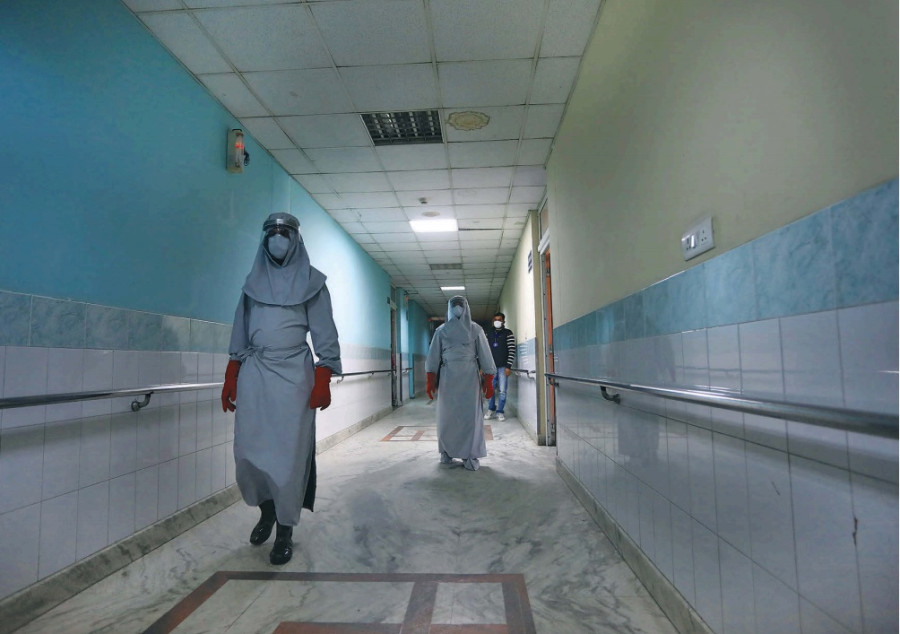Health
‘We may not have enough health workers to attend to patients’
Hospitals treating Covid-19 patients lack sufficient personal protective equipment, putting health workers at high risk of exposure. As more and more health workers get infected, other hospital departments are closing.
Arjun Poudel
Dr Dinesh Kafle, executive director at the Tribhuvan University Teaching Hospital, was counting the number of personal protective equipment like body covers, N-95 masks, gloves, shoe covers and other essentials in stock on Tuesday afternoon when the Post contacted him.
“If the suppliers do not supply additional equipment by the end of the day, it will be a problem for us to send health workers to the Covid-19 ward, and the ICU,” said Kafle. “We need over 100 pieces of personal protective equipment every day just to attend to Covid-19 patients.”
Health workers, including doctors serving in other departments as well as the emergency ward, also need personal protective equipment but owing to the shortage, the hospital has not been able to provide enough quantities to them.
“This makes them risk their lives,” said Kafle.
Public health experts warn that a rise in infection rate in health workers is a sign of another looming catastrophic situation.
“Not only are new cases on an exponential rise, but health workers are getting infected in rising numbers, which is alarming,” an official at the Department of Health Services, told the Post, asking not to be named, as he feared retribution. “We have not been taking the risk seriously since the beginning. A situation may arise in which we will not have enough health workers to attend patients.”
The Epidemiology and Disease Control Division of the Health Ministry, which keeps records of infected health workers, does not have the exact data on this since the official in charge of maintaining it has been transferred.
“We are working on a new software to keep the records,” an official at the division told the Post, asking not to be named. “If you contact us after two weeks, we can provide you with the exact number of infected health workers.”
Officials said that the number of infected health workers, including doctors, is over 2,000. At least three health workers, including a doctor, have died of Covid-19. As of Tuesday, over 200 health workers, including doctors, at the Tribhuvan University Teaching Hospital have tested positive. The hospital administration said that it has been struggling to continue some of its services, as a lot of health workers are testing positive every day.
“We shut down the neurosurgical and neuro medicine unit today as six health workers there got infected,” Kafle added. “Other six health workers, including doctors, in the emergency department also tested positive today. We disinfected the department and have resumed services.”
The lack of personal protective equipment is an issue in other hospitals in the Capital too like Bir Hospital, which has been converted into a Covid-19 hospital.
“Our stock of safety gear, including personal protective equipment, is insufficient even for a week, “ Dr Kedar Prasad Ceintury, the hospital director, told the Post. “We depend on the safety gear donated by social organisations.”
Health workers serving in the hospital have complained to the Post that they are compelled to reuse masks and buy them on their own due to the failure of the administration to supply them. Around 150 health workers at the hospital have already tested positive for the coronavirus, according to the hospital administration.
“We are struggling to manage human resources, as a lot of our staff are getting infected every day,” said Ceintury, who added that the hospital needs over 1,000 surgical masks and over 200 personal protective equipment, including N-95 masks, every day.
The Department of Health Services, which is responsible for arranging personal protective equipment and other safety gear to public hospitals, said that it had transferred the budget to hospitals to purchase the necessary equipment.
“We have allocated the budget to the provinces and to the hospitals to buy necessary equipment including safety gears,” said Dr Dipendra Raman Singh, director general at the department. “Most hospitals buy personal protective equipment on their own, and we too have been supplying it to some hospitals.”
Government officials have repeatedly downplayed the seriousness of the situation and once said that the number of cases in the country would not reach 100. As of Tuesday, 90,814 people have tested positive with 563 deaths. In the last 24 hours, 1,551 people tested positive, including 1,017 in Kathmandu Valley, according to the Health Ministry. The tally for Kathmandu Valley stands at 32,087.
Public health experts, however, are not surprised by this shortage of safety gear in public hospitals as new cases continue to rise colossally.
"I had said at the time of the budget speech that the budget allocated for health would not help in controlling the pandemic," said Dr Baburam Marasini, a former director at the Epidemiology and Disease Control Division.
With previous restrictions on movement, and with the number of cases rising, much fewer patients have been going to hospitals, and this has affected revenue streams.
“This is also a reason for the budget crunch,” said Kafle.
Patan Hospital, another dedicated Covid-19 hospital, has been producing the personal protective equipment in-house and reusing them to cope with the shortage.
“It is not possible for us to use disposable personal protective equipment, as it is too expensive. We are reusing the personal protective equipment for a fortnight,” Dr Ravi Shakya, director at the hospital, told the Post. “I have been in isolation for a week. Over six dozen health workers, including doctors at our hospital, have already been infected.”
“The lack of personal protective equipment for health workers means inviting a disaster,” said Marasini. “If health workers get infected, they will be superspreaders.”
“We may lack health workers if we fail to protect those working on the front line.”




 17.12°C Kathmandu
17.12°C Kathmandu















